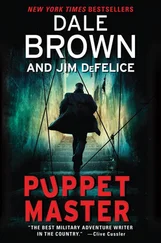“How do you know they’re going to retaliate?”
White looked at him grimly. “Because Iran has been preparing for exactly this attack for years, ever since the end of the Iran-Iraq War. We just justified all the billions of dollars they’ve been spending on modern weapons for the past six years. They aren’t going to rest until someone—until everyone—is punished for what happened today.”
TEHRAN, IRAN
THIRTY MINUTES AFTER THE ATTACK ON ABU MUSA ISLAND General Hesarak all-Kan Buzhazi was supreme commander of the Islamic Republic’s Armed Forces and commander of the Revolutionary Guards—and this was the first time in his career that he had ever been admitted to the residence of the leader of the Islamic Revolution, the Ayatollah Ali Hoseini Khamenei. And to tell the truth, he was scared. But as scared as he was to be in the presence of a man who, like Ruhollah Khomeini before him, could by a single word muster the lives and souls of a quarter of a billion Shiite Muslims to his side, it was even more exciting to consider the simultaneous disaster and opportunity that had befallen him that morning. This was one opportunity that could not be missed.
Buzhazi bowed deeply when shown into his presence, and kept his head bowed until the Faqih spoke. The door was closed behind them. “Your Eminence, thank you for this audience.”
“Some disturbing news has reached me this morning, General,” Khamenei said quietly. “Allah has told me of a great threat to the Republic. Tell me what has happened.”
Buzhazi raised his head and stood solemnly, his hands respectfully clasped in front of him as if standing at an altar or at prayers.
Khamenei was in his late sixties. While his predecessor, the Imam Khomeini, had been tall, gaunt, and ethereal, Khamenei was short, with a round face, a short, bushy dark beard, and large horn-rimmed glasses, which gave him a scholarly, professional, quick-witted appearance. This man before him was the nominal Faqih, the font of jurisprudence of the Islamic Republic and the ultimate lawmaker, whose word could overrule the Parliament and any cleric, any lawyer, any scholar in the Twelver House; he was also the named Marja Ala, the Supreme Leader and spiritual head of the Shiite Muslim sect and the keeper of the will of the twelfth Imam, who was hidden from the world and would soon return to call the faithful to Allah’s bosom for all time.
But for all that, he was a man, not a saint or a prophet. Buzhazi had known Ali Hoseini Khamenei when he had been nothing but an ambitious, back-stabbing know-nothing firebrand from a wealthy pro-Shah cargo shipping family from Bandar-Anzalt on Iran’s Caspian coast. Little more than a spoiled rich kid back then, Khamenei had wanted to impress his friends and rebel against his parents by joining up with the wild, shrill-voiced fundamentalist Shiite cleric named Ruhollah Khomeini. He had joined the Khomeini revolution because it was cool and tough to do so, not because he’d had any particular holy vision like Khomeini, but as time went on, he became deeply committed to Khomeini’s theocratic ideas. Khamenei held many high positions in government service—soldier, first commander of the Revolutionary Guards, even president of the republic. Now he was the Supreme Leader.
But he was still just a man. Buzhazi had seen this holy man angry, and sad, and drunk, and just plain stupid.
Buzhazi knew a lot more about Khamenei’s shadowy past. Khamenei was a well-trained soldier as well as an accomplished politician, and throughout his rise through the ranks of power, he’d left a lot of bodies in his wake. Iran was nearly being overrun by Iraq at the beginning of the nine-year War of Retribution; when the president, Abolhassan Bani-Sadr, accused the then-commander of the Pasdaran, Khamenei, of not doing his job and failing the country, suddenly the Ayatollah Khomeini dismissed Bani-Sadr. When a rival politician, Muhammad Ali Rajai, was elected President in 1981, he and his Prime Minister were mysteriously killed in a bomb blast in the Cabinet room-Khamenei somehow survived. Time after time, Ali Hoseini Khamenei was able to fight off challenges to his authority by strange combinations of shrewd political infighting and unexplained and well-timed disasters.
So now, he told himself to overcome his fears and apprehensions and remember exactly who he was dealing with here, relax. Take command of this situation, he ordered himself. Take charge now!
“The Republic has been betrayed, Eminence,” Buzhazi began. He knew that word betrayed would arouse Khamenei’s attention “My orders were countermanded, and because of this, our main island protectorate in the Persian Gulf, Abu Musa, has been attacked by Gulf Cooperative Council air forces.”
Khamenei seemed surprisingly relaxed as he heard the news—well, probably not surprising. It wasn’t from divine inspiration that he’d first heard about it, Buzhazi knew, but from his contacts in the VEVAK, the Iranian Ministry of Intelligence and Security.
Buzhazi had no control of that group—they reported directly to the Council of Guardians and to Khamenei. “What kind of damage was sustained? What casualties?” Khamenei asked.
“Few casualties, thanks to Allah, and only a handful of injuries,” Buzhazi said dismissively. “The attack was directed against the Silkworm and Sunburn anti-ship missile emplacements, and the major port facilities.
Unfortunately, the attack caused some damage.”
“My information says the damage was considerably more than that,” Khamenei said.
It had been less than an hour since the attack, Buzhazi reminded himself, and Khamenei already had a briefing from his intelligence people—very efficient work for a pious holy man. This man did not sit contemplating his navel in an ivory tower. He was fully engaged in the operation of the government. “Regrettably, that is true,” Buzhazi said. “But island defenses will be restored by the end of the day, and until then, we have naval and air forces on the scene to maintain security.”
“How fortunate,” Khamenei said, almost in a whisper, like the hiss of a snake’s tongue. “But your defensive strategies for Abu Musa seem to have been somewhat shortsighted”
“Eminence, with all greatest respect, that was not the case,” Buzhazi said. “The defensive systems I placed on the island were designed to protect the defensive anti-ship missile emplacements from high-and low-altitude air threats as well as massed maritime threats. The island was under surveillance by long-range radars from Bandar Abbas and by short-range radars from Abu Musa Island itself. In addition, we have seven thousand troops on that island to defend against amphibious assaults, all very much aware that our enemies were seeking to destroy those weapons and take those islands from us at any time. All island defenses were fully functional and on full alert.”
“And so why were these defenses so easily destroyed, General …?”
“Because President Nateq-Nouri countermanded my general orders to launch on alert,” Buzhazi said angrily, “and instead ordered that, unless the island was unmistakably under direct attack, that all launch orders be issued by the Defense Ministry in Tehran, not by the on-scene commanders.
It was madness! I argued against that policy and appealed to reverse the order..
“The Council of Guardians has not received any such notification or appeal,” Khamenei pointed out.
“I was going to present my arguments in person with your representative at the next meeting of the Supreme Defense Council,” Buzhazi lied, knowing full well that Nateq-Nouri had never countermanded any of Buzhazi’s orders. The policy of “launch on alert”—fire without warning on any vessel or aircraft that crossed Iran’s claimed borders or boundaries—had never been an official peacetime policy of the Iranian government except over Iran’s most highly classified research centers, bases, or over the capital or the holy cities. The simple fact was that Iran possessed few trained individuals and workable air defense systems for very low-altitude air threats; even if the forces on Abu Musa had had “launch on alert” orders, they probably wouldn’t have been able to stop the attackers.
Читать дальше












